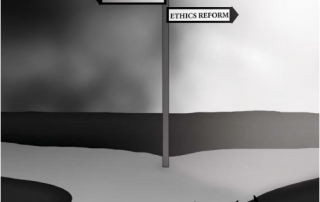Ethics
Floridians deserve a government that operates at the highest level of ethical integrity. Such a government must establish ethical standards for public officials and recognize the right of citizens to guard against the abuse of the public’s trust.
- Florida’s first successful constitutional initiative resulted in the adoption of the 1976 Sunshine Amendment, providing constitutional guarantees of ethical standards in government. To enforce those standards, the Sunshine Amendment requires there be an independent commission (the Florida Commission on Ethics) to investigate complaints alleging breaches of the public trust by public officers and employees.
Florida’s Code of Ethics for Public Officers and Employees is found in Chapter 112 of the Florida Statutes. The Ethics Code is intended to ensure that public officials conduct themselves independently and impartially, not using their offices for private gain.
What would be a public official ethics violation?
According to the Ethics Code some violations include –
- Solicitation and Acceptance of Gifts
Public officers, employees, local government attorneys, and candidates are prohibited from accepting anything of value, such as a gift, loan, reward, promise of future employment, favor, or service, that is based on the understanding that their vote, official action, or judgement would be influenced by such gift. Section 112.313 (2), Florida Statutes.
- Misuse of Public Position
Public officers and employees, and local government attorneys are prohibited from corruptly using or attempting to use their official positions or the resources there of to obtain a special privilege or benefit for themselves or others. Section 112.313(6), Florida Statutes.
- Voting Conflicts of Interest
No county, municipal, or other local public officer shall vote in an official capacity upon any measure which would inure to his or her special private gain or loss, or which the officer knows would inure to the special private gain or loss of any principal by whom he or she is retained, of the parent organization or subsidiary or sibling of a corporate principle by which he or she is retained, of a relative, or of a business associate. Excerpted from section 112.3143, Florida Statutes.
Visit to learn more about Florida Ethics Laws and Violations –
Florida Code of Ethics: Click Here to Access
Florida Commission on Ethics: 2020 Guide to the Sunshine Amendment and Code of Ethics for Public Officers and Employees
What is Public Official Financial Disclosure?
All constitutionally elected officers in Florida are required to file the full financial disclosure form (FORM 6) by July 1 every year with the Florida Commission on Ethics.
FORM 6 requires politicians to provide a detailed release of their account information including assets, liabilities, and sources of income over $1,000 and their values, as well as net worth. Officials may opt to file their most recent income tax return in lieu of listing sources of income.
What about my public officials’ Form 6?
Floridians can search for public official’s FORM 6 financial disclosure forms here.
Financial Disclosure Process, Deadline, and Fees:
Financial disclosure is due July 1 of each year for the preceding calendar year. A grace period is in effect until September 1. If the disclosure is not filed or postmarked by September 1, an automatic fine of $25 per day will begin to accrue and will continue to build until the disclosure is filed, or the fine reaches $1,500.
Fines may be appealed to the Commission, which can waive or reduce the fine, if unusual circumstances prevented the filer from filing on time.
Are there public officials who do not file on time? Yes, many.
View a report on public officials who have either not yet filed, or filed after the reporting deadline, and who accrued or are accruing automatic fines here.
That is a small price to pay for nondisclosure.
$1,500 is a small fee to pay to avoid disclosing financial information. The Florida Commission on Ethics should increase the fine limit significantly to incentivize elected officials to have higher financial ethical standards.
Research Publications
Florida’s Path to Ethics Reform
Download the full PDF report here.
January 2016
Executive Summary
Florida is making progress in the fight against public corruption. Ethics reforms that were passed in 2013 and 2014 represent the first significant attempt to update the state’s ethics laws since the 1970’s and since the 2012 publication of Integrity Florida’s report titled Corruption Risk Report: Florida Ethics Laws. Yet when measured against the benchmarks cited in that report, it’s clear much more remains to be done if government in Florida is to be more open, ethical and accountable to its citizens.
Florida went too long neglecting public corruption and ethical abuses and […]
Tough Choices Facing Florida’s Governments
Tough Choices: Best Practices in Campaign Finance and Public Access to Information
November 2012
Download the full PDF report here
Florida prides itself on being an open-government state and strives to make information available to citizens in a usable and understandable form. While the 2013 campaign finance reform law was a welcome first step, there remain areas where transparency and public access can be improved. As evidence, a recent scorecard from the National Institute on Money in State Politics gave the Sunshine State a “D” grade for disclosure requirements. This study explains the details of that report card and prescribes steps policymakers […]
Corruption Risk Report: Financial Disclosure
Download the full PDF report here
July 2012
Executive Summary
According to the Center for Public Integrity (CPI), Florida earned a D grade, ranking
26th in the U.S. for legislative financial disclosure in 2009. Louisiana ranked No. 1 on
CPI’s disclosure ranking, up from 44th in 2006. Louisiana Gov. Bobby Jindal worked
with his state legislature in 2008 to pass new ethics laws that moved their state from the
bottom to the top of the list. Louisiana Economic Development, that state’s counterpart
to Enterprise Florida and the Florida Department of Economic Opportunity, touts ethics
reform on its website. Gov. Jindal said he set out to “completely transform the […]
Corruption Risk Report: Florida Ethics Laws
June 2012
Executive Summary
Florida led the U.S. in federal public corruption convictions from 2000 – 2010, according to U.S.
Department of Justice data. Corruption was a top ten factor Forbes magazine pointed to in 2012
when it named three Florida cities to its list of America’s Most Miserable Cities: #1 Miami, #4
West Palm Beach and #7 Fort Lauderdale. Florida also received a failing grade for ethics
enforcement agencies on the Florida Corruption Risk Report Card released in 2012 by State
Integrity Investigation.
Florida faces a corruption crisis that threatens the state’s reputation, its economy and its ability to
attract new jobs and […]




